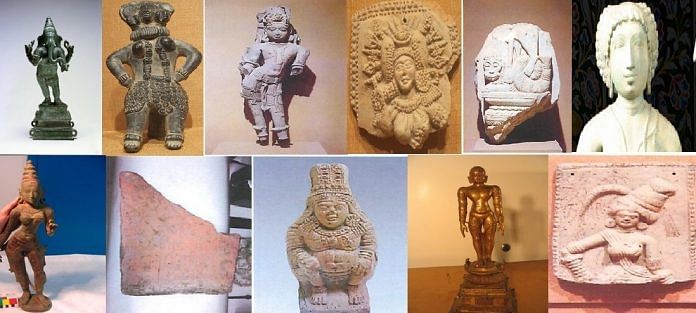Draft antiquities bill seeks to do away with requirement of a licence for selling antiques; some ASI officials claim government buckled under pressure from art dealers
The draft antiquities bill, aimed at abolishing state regulation in the business of art and antiques, comes after years of relentless lobbying by dealers and collectors and is seen as a milestone in the effort to cut red tape art lovers faced. But some bureaucrats and art experts fear that the proposed law could boost smuggling and illegal trade.
The Centre, last month, proposed to do away with the requirement of a licence for selling antiques.
The Antiquities and Art Treasures Act has been in force since 1972, though amendments have been in the pipeline for many years, thanks to the art community’s relentless lobbying.
Under the present law, only individuals with licences issued by the government are authorised to sell antiques within the country. Further, any individual in possession of an antique piece is required to register the object with the government.
“Stakeholders in the world of art and its preservation have been lobbying for a policy change in this area for the past 15-20 years,” said Delhi-based art historian and curator Naman Ahuja. “It is an absolutely necessary first step to get rid of licences and registrations to fix the system.”
The draft bill seeks to make the business easier and transparent, and change the perception among the public that the process of registration is laden with cumbersome government procedures, said D.N. Dimri, director (Antiquities), ASI.
However, some officials of the ASI, which drafted the bill, claimed they were under pressure from the art collectors’ lobby.
“There has always been immense pressure from the dealers to get rid of the licence system,” said a senior ASI official, speaking on condition of anonymity. “Finally, the government buckled under pressure from the influential community of dealers and curators, and provided us terms of reference to draft the bill. They even appointed a retired additional secretary to formulate the draft for the ASI.”
State control vs free market
At the heart of the dispute between the ASI on one side and the art community on the other, is a long-running debate over free market and state control.
While the entire country got rid of the licence raj in 1990, the antiques market continued to suffer due to excessive state control, Ahuja claimed. “The state dug its own grave by claiming ownership and responsibility of the entire quantum of antiques scattered across the country,” he said, calling the present law inherently “impractical” and an “abysmal failure”.
Ahuja said even though the law was “noble” in its intention, it had not succeeded in curbing the smuggling of antiques in the past 45 years.
He wondered as to how many objects the government had managed to get registered in the past four decades, despite the mandatory registration clause.
The senior ASI official agreed: “Not more than 3.5 lakh (objects have been registered). Yet, we are a little conservative in this regard. We feel that there must be some state mechanism to register what is the country’s heritage.”
Boost for illegal trade
The official also expressed concerns about the new system leading to illegally acquired antiques being traded freely without any questions asked.
A retired ASI official, who also chose to remain anonymous, agreed. “The proposed law does away with the requirement to declare the source of acquisition. So, anyone who has acquired antiques through theft or deceit can now trade them freely.”
In place of the present cumbersome registration process, the draft bill proposes uploading information regarding possession of antiques online. “How many people will actually use the portal,” the retired official asked.
Far from curbing illicit trade, the proposed law may give a boost to illegal acquisitions, said Sudha Gopalakrishnan, former director at the National Mission for Manuscripts.
However, Ahuja rebutted these concerns. “One can talk about the limitations of the proposed law if the present system has succeeded,” he said.
“Our entire attitude with regard to our country’s heritage is warped, giving the state the sole authority to be the arbiter of art. If you’re de-licensing, you’re robbing the state of its control to dictate the narrative on art and culture, and this may be one of the reasons why there has been this resistance to a policy change.”



